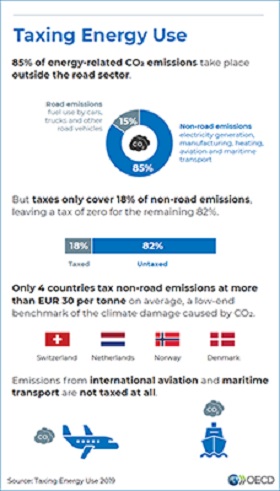Analytics, Ecology, Energy, EU – Baltic States, Modern EU, Taxation
International Internet Magazine. Baltic States news & analytics
Friday, 26.04.2024, 01:34
Energy issues: pollution and taxation
 Print version
Print version |
|---|
During 2018, both global energy consumption, as well as the
energy-related CO2 emissions, rose strongly; the latter reached a new all-time
high level, according to the recent OECD analysis.
Several global agreements, including Paris Agreement and UN
SDGs in 2015, have required deep cuts in emissions. Well-designed systems of
energy taxation encourage citizens and investors to use clean energy sources
and increase pollution reduction.
It has been is a proven fact that fuel excise and carbon
taxes are presently the simplest and cost-effective tools to combat pollution;
however, the national policies on carbon pricing are often completely
inefficient.
Besides, taxes on different energy sources could also
contribute to limiting health damage from local pollution, which is becoming a
major issue for decision-makers in a modern highly urbanized world.
Recent OECD “Taxing Energy Use-2019” presents a review of
member states’ position in deploying energy and carbon taxes; it shows the
progress made by states accompanied by “effective advises” on more efficient
pollution prevention from energy usage(tax rates are detailed by country,
sector, energy source and tax types).
The use of a common methodology ensures full comparability
of tax rates and structures across countries. Taxing Energy Use 2019 brochure
highlights key facts and figures that are featured in the publication, due to
be released mid-October 2019.
Table I. Average
fuel excise and carbon taxes in OECD states (incl. international aviation
and maritime transport); in EUR per tonne of CO2/July 2018.
1.Fuel excise duty 2. Carbon tax 3. Effective carbon tax (1+2)
Coal/other solid fossil fuels 0.61 0.13 0.73
Fuel oil 3.50 0.46 3.96
Diesel 70.65 3.11 73.76
Kerosene 4.27 0.34 4.61
Gasoline 84.34 1.50 85.83
LPG 10.23 0.89 11.12
Natural gas 4.08 1.19 5.26
Other fossil fuels 0.38 0.31 0.69
Non-renewable waste 0.05 0.02 0.08
Biofuels 4.52 0.12 4.64
Note: Tax rates assessed in July 2018. The effective carbon
tax is the sum of fuel excise taxes (the statutory rates are expressed in
common commercial units, such as liters of gasoline) and explicit carbon taxes
(the carbon taxes are expressed in commercial units of CO2 emissions). Biofuels
(as CO2 emissions from the combustion of biofuels) are considered zero in the
greenhouse gas inventories under the Paris climate change agreement. As is
seen, the carbon tax rate on coal is almost zero.
Source: OECD (2019), Taxing Energy Use 2019: Using
Taxes For Climate Action.
Reference to the brochure: http://www.oecd.org/tax/tax-policy/brochure-taxing-energy-use-2019.pdf
The OECD urged the member states in July 2019 to deal with a
growing anger in some states (particularly among young people) on
“decarbonizing economies”, with taking into consideration a high level of
emissions from numerous energy sources. While energy taxes are stagnating, the 2019 OECD report on fossil fuels has
shown that several governments still support fossil fuel production and use;
e.g. about US$140 billion was used in 2017 in the US only, with growing level
of subsidies in other countries.
Source: https://www.oecd.org/fossil-fuels/data/OECD-Fossil-Fuels-Support-database-brochure-2019.pdf.
OECD: taxing energy use report-2019
The OECD-2019 report on taxing energy use underlined that
improving tax policy provided a fair chance to low-carbon technologies and
would help shift investment to greener options.
The report looks at three types of tax on energy: excise
taxes on fuels, carbon taxes and taxes on electricity use (in areas of
power and heat generation, industry and transport).
The report recommends that governments should ensure that
any tax rises resulting from tax reforms do not hurt vulnerable households,
firms or workers. Extra tax revenues can be used for social purposes such as
lowering income taxes, increasing spending on infrastructure or health, or
funding direct transfers to households.
Adjusting taxes, along with state subsidies and investment,
is vital to encourage a shift to low-carbon energy sources, less polluting
transport, as well as industry and agriculture. Given the difficulties of
making big changes without hurting industries or communities, the OECD analysis
shows how factoring in potential synergies and trade-offs between emission
reduction goals and broader societal objectives such as better health, jobs and
affordability of services can increase the incentives for swift action to cut
emissions.
According to the report, in 44 highly developed countries
over 90% of energy-related CO2 emissions (outside of road transport) are taxed
far below the levels that would reflect negative damage to nature and
environment. By the way, only four European countries: Denmark, the
Netherlands, Norway and Switzerland tax non-road energy pollution above EUR
30/t CO2, which is considered a low-end estimate of the costs to the climate of
carbon emissions; several European countries have even lowered energy taxes
during recent years: e.g. the UK, France, Italy and Germany.
Taxing polluting sources of energy is an effective way to
curb emissions that harm the planet and human health; the generated income can
be used, for example, to ease the low-carbon transition for vulnerable
households. Yet 70% of energy-related CO2 emissions from advanced and emerging
economies are mostly non-taxed, which is offering little incentive to move to
cleaner energy.
According to the OECD report, the high income states are
responsible for over 80% of energy emissions in the world; and the taxes on polluting
sources of energy are not set anywhere near the levels needed to reduce the
risks and impacts of climate change and air pollution.
Source: the report: http://www.oecd.org/tax/taxing-energy-use-efde7a25-en.htm;
it will be available for public from the middle of October 2019.
Another OECD analysis titled “Accelerating climate action: refocusing policies through a well-being lens", is focusing on goals like clean air, healthy eating, accessibility of services and employment; the inclusive fiscal reform could make it easier to introduce changes that will end up accelerating the low-carbon transition while improving human lives. The analysis is to be presented at the 2019 UN Summit.
More in: http://www.oecd.org/environment/accelerating-climate-action-2f4c8c9a-en.htm
Taxes on transport energy and road fuel are relatively high;
yet they rarely fully reflect the cost of environmental damage, especially when
some road transport sectors are offered preferential rates. Taxes on coal –
which is responsible for almost half of CO2 emissions from energy sources – are
zero or close to zero in most countries.
Taxes are often higher on natural gas, which is cleaner; for
international flights and shipping, fuel taxes are zero, meaning long-haul
frequent fliers and cargo shipping firms are not paying their fair share. See
more on Table II below.
Table II. The level of taxation in energy use/non-road sectors

Situation in the Baltic states and the EU is quite
complicated concerning taxation in road/non-road emissions. Thus, comparing
carbon tax in road emissions between 2018 and 2015 (in euro/per ton of CO2,
with the EU’s carbon benchmark of euro 30/ton CO2), Latvia reduced taxation
from 160 to 150 in 2018; Lithuania has had a stable level of 130 euro/ton,
while Estonia increased taxation from 160 to 200 euro/ton in 2018, following
the same example in Denmark.
Since 2015, average effective carbon tax rates on non-road
emissions increased by more than EUR 30 per tonne of CO2 in only three OECD
countries: Denmark, the Netherlands and Switzerland. Most of the OECD states
are having effective carbon tax in non-road emissions which is much lower than
the EU’s benchmark of 30 euro/ton CO2: Estonia -from 2 to 5 euro in 2018,
Latvia -from 2 to 6, Lithuania has a fixed rate at 12 euro.
Carbon price signals are stronger in road transport, mostly
because of relatively high fuel excise taxes, but this is a sector where
non-climate external costs are also relatively high. The only three countries
that do not tax road emissions at all are Brazil, Indonesia and the Russian
Federation.
Highest carbon taxes rates in transport sectors (in euro per
ton of CO2, and in national currencies) are in Sweden (SEK 1.150), Finland
(euro 62), France (44,6), Denmark (DKK 173), the UK (GBP 18), etc; compared to
Latvia with 5 euro and Estonia with 2 euro.
Source: OECD report
“Taxing energy use:
http://www.oecd.org/tax/taxing-energy-use-efde7a25-en.htm








 «The Baltic Course» Is Sold and Stays in Business!
«The Baltic Course» Is Sold and Stays in Business!

